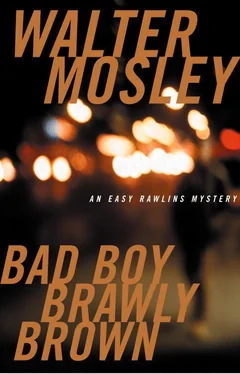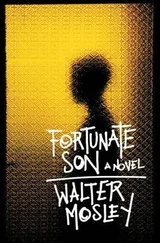While I was wondering what my next move should be, a white man emerged from a brand-new Ford parked halfway up the block. I had noted the car but not the man in it. He was obviously waiting for Conrad, too. The man wore a comic-book green suit and moved stealthily at first and then very quickly.
Conrad had just opened his door when he sensed or maybe heard the white man moving behind him. Before he could turn around fully, the white man hit Conrad in the temple and the arrogant young man fell into his house. The door closed quickly behind them, and I was left to consider the new situation.
My first thought was to drive down to the corner, call the police from some phone booth, and drive away. Even in the days when I was a fixture of the shadier side of Watts, I knew better than to get involved with the business of the streets.
And this was definitely street business. The white man in the green suit wasn’t a cop or a revolutionary, nor was he a member of the Klan or a jealous husband. He was there to perform a sort of criminal bookkeeping that used rope instead of ledger paper and brass knuckles instead of an adding machine.
I should have left but I had another kind of business at hand. There was my friend John and his need. There was the fever burning like a funeral pyre over Mouse’s death in my mind.
I waited for fifteen seconds or so and then went to the house next door to Anton’s. I pushed the buzzer but no one answered. I knocked loudly, just in case.
This house was a ranch-style wooden building. Freshly painted with a beautiful and delicate lawn surrounding it. The backyard had a large vegetable plot but most of the plants were dead. Only one hardy tomato bush still held about half of its green leaves — one medium-sized deep red fruit hanging heavily from an upper branch. There was a nervous hunger gnawing at my gut, so I plucked the tomato. California supermarkets never had tomatoes that tasted so sweet. They were all grown in hothouses without the benefit of nature.
While still swallowing the sweet flesh, I picked up a terra-cotta pot from the back porch of the ranch house and leapt over the waist-high wire fence that separated Conrad’s lot. I went silently to his back door and pressed my ear against it.
“Please!” a man shouted. “I’ma have it by Sunday. By Sunday mornin’, I swear.”
There was a thud of a blow being delivered, then a groan, and then the heavier thud of a body falling to the floor.
“Mr. London don’t wanna hear your nigger jive, Anton,” another voice said.
Conrad groaned again, making me suspect that he’d received a kick in the ribs.
“Sunday, man. Sunday, I swear,” Conrad whined. “It’s all set up.”
Another thud. Another groan.
“I know you gonna pay, nigger,” the white man said. “I know because after I burn your ass, you won’t ever forget to pay anybody ever again.”
Maybe, if the thug stuck to his regular job, that is, a sound beating for a late payment, I might have stood by until he was through. My best bet was to wait for him to soften Anton up. And then, when he’d gone, I could come in and ask a few questions about Brawly. But anything having to do with ropes or fire when it comes to black-white relations was bound to set my teeth on edge.
Conrad’s back porch was just a door and two concrete steps. I smashed the pot on the stairs and then plastered my back against the bricks. The first effect was complete silence, then fast steps coming toward the door. When he rushed out I caught him on the side of the jaw with a short right that had all of the evil intentions of Archie Moore. I followed with a left and then two more right hooks. The final punch missed because the white man in the ridiculous suit was already on the ground. His eyes were open but I doubt if they saw very much.
I lifted him by his garish lapels and let go long enough to connect with a powerful right hand. I kicked him twice when he was down and out. I didn’t kick him out of revenge or rage, at least mostly those weren’t the reasons. This was a dangerous man who knew how to inflict pain and, probably, death. The impact of those body blows would slow him up even if he regained consciousness.
I removed the pistol from his belt, dragged him inside the house, and closed the door.
Conrad had risen, propped up on his left hand. There was a pistol clutched precariously in the fingers of his right. I plucked it free and put it in my pocket to go along with the gangster’s piece.
Feeling the weight of three pistols in my pocket made me smile. It reminded me of a well-spent and wasted youth in Houston. Many a night I carried my friend’s weapons when they were likely to be arrested or searched.
Various odors wafted through the air. A garbage pail that should have been emptied three days before, a toilet that should have been flushed that morning.
Conrad writhed on the floor, wrestling with gravity and balance; it was a losing battle. The gangster was dead to the world, but breathing.
I knelt down and pinched Conrad very hard on the cheek. He came to full awareness with a painful start.
“What?”
“You might be dead now,” I said. “If it wasn’t for me.”
“What?”
“Your boyfriend over there.”
Conrad turned his head to catch a glimpse of his attacker on the floor next to him, then he toppled over.
“Shit,” he said.
In the corner was a door that led to the fragrant toilet. I searched the unconscious gangster for any more weapons and then dragged him into the bathroom and closed the door after him. The window in the toilet was about the size of a cow’s head, too small for a full-grown man to crawl out of, so I wedged a metal-framed chair against the doorknob, assuring myself that we wouldn’t be interrupted.
Conrad had pulled himself up so that his back was against the wall. We were in a dark room that had once been a kitchen. Dark because there was only one small window and two forty-watt bulbs for light, and once because the stove was dismantled, the refrigerator was open and unplugged, and all the shelf space and the sink were piled with books and magazines, cans of paint, and various tools. The unfinished wooden table had one metal chair (which I’d used to imprison the thug), a typewriter, and various sheets of paper.
Conrad glared at me.
“I know you,” he said.
“I guess that means he didn’t knock the sense outta your head.”
“What you doin’ here?” he asked. “I mean, how’d you find me?”
“What’s happening Saturday?” I asked him.
Conrad’s attempt at looking innocent was enough to make me want to laugh.
“You know,” I said. “You told that man beatin’ on you that you could pay your debt on Sunday after you did something on Saturday.”
“I... I... I was just talkin’, brother. Tryin’ to save my ass from gettin’ kicked.” Conrad looked away from me, trying to hide the lie in his eyes.
“Oh,” I said. “I thought it had to do with those stolen guns you and Brawly took over to BobbiAnne’s house.”
Making no attempt to rise, Conrad looked up into my eyes. He did not blink.
“You and Xavier plannin’ some kinda war?” I asked, just to keep up the pretense of a conversation.
“No. No. I’m gonna move them guns is all. Move ’em and then split the money with Bad Boy. On Saturday.”
On a whim I asked, “What you got to tell me about Aldridge Brown?”
Again his eyes darted away.
“Did you kill him, or did Brawly?” I asked.
“I don’t know what the fuck you talkin’ about, man. I never heard’a no Alvin Brown.”
“Where’s Brawly?” I asked.
“I don’t know.”
“Does he have a room somewhere?”
“I only see him at the meetins,” he said.
Читать дальше












